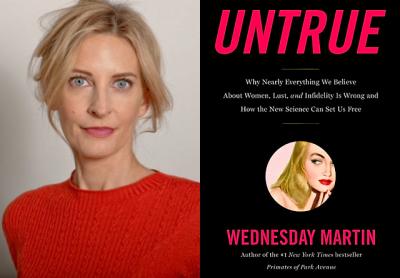I’ll Have What She’s Having

“Untrue”
Wednesday Martin
Little Brown Spark, $28
For heterosexual husbands, or men engaged in long-term monogamous relationships with women, Wednesday Martin offers this advice for starting 2019 with a bang: Give your lady a “hall pass.”
The part-time Sag Harbor resident and author of the clunkily titled “Untrue: Why Nearly Everything We Believe About Women, Lust, and Infidelity Is Wrong and How the New Science Can Set Us Free” had more accurately suggested in the British press that such an item would make a stellar holiday gift for the picky spouse. “This Christmas give your wife something she really wants. Something truly exciting: a hall pass,” she said.
The hall pass, according to Ms. Martin, a social researcher and cultural critic, is redeemable for sex with someone other than your long-term partner while remaining committed to the primary relationship. It could be for a one-off festive fling or, as long as both parties agree, the start of a beautiful polyamorous arrangement, also known as consensual non-monogamy.
The reason we women might need this “quickie voucher” is at the core of “Untrue,” which attempts to shatter the central fallacy that women find monogamy easier than men. In fact, the opposite is true, the author argues, because a woman’s libido is every bit as demanding as a man’s. The untruths about male and female desires — that women instinctually want to be “true” in a monogamous relationship, while men are hard-wired to be gadabouts — have been man-made, presented by male scientists from Charles Darwin down. Drawing from tremendous research conducted by a number of eminent female social scientists, “Untrue” makes the bold claim that women crave sexual variety just as much as men do. Perhaps even more.
In a chapter titled “Women Who Like Sex Too Much,” Ms. Martin writes, “It tends to be women, I was repeatedly informed, who are telling their partners that they want open relationships and marriages, or that they want a sexual and romantic life unbeholden to the dyad. . . . Rather than throwing ‘female Viagra’ at these women, what if we told them the truth? That it’s normal for women to get bored? That it’s normal to want to have sex in lots of different ways, with many partners? And that women too, and perhaps especially, have cheating minds and hearts and bodies?”
In support of her thesis, she takes us on a rollicking ride through history, revealing that it was the development of farming, in Jordan about 12,000 years ago, that introduced the idea of a woman’s place being in the home. According to the author, plowing required more upper-body strength and “led to a new and rigidly gendered division of labor.”
Ms. Martin, whose 2015 New York Times best-selling memoir, “Primates of Park Avenue,” caused a huge stir because of factual inconsistencies, is a talented writer and manages to turn relatively dry material into sexy and often titillating prose. Her interviews are extensive and include experts in primatology, cultural and biological anthropology, psychology, sociology, and medicine. Remarkably, it all adds up to a rather fun read.
But her title promising a “new science” seems awfully hyperbolic. Mostly, her scientific findings date back at least a couple of decades. The majority of her anthropological examples of cultures in which females live openly in non-monogamous arrangements involve remote African tribes, such as the Himba of Namibia, in which nearly 32 percent of babies are fathered through extramarital affairs, the Ache tribe, whose members once roamed the hilly forests of Paraguay, and the women of Lesotho, a small country near South Africa, who seem to be having it off with everyone while their husbands are away.
There’s also much on the sexual appetite of female bonobos, our oversexed closest primate relatives, who like to resolve conflicts through sexual activity. Again, this is hardly new evidence. In the mid-1970s, Takayoshi Kano, a Japanese primatologist, was one of the first to document the central position of females in bonobo society, discovering that they mated with different males and sometimes even with juveniles or infants.
So, out there in the lawless wild, everybody seems to be having a raucous time. But what about in the civilized West? According to one interviewee, who had a husband and several partners, the key to success is a shared Google calendar.
The author also learned about polyamory in our society during a workshop on consensual non-monogamy hosted by Mark Kaupp, a New York therapist. The workshop offered advice on managing open relationships, ranging from couples who agreed not to disclose their infidelities to polyamorous couples discussing “mandatory disclosure” and “ethical non-monogamy.” And often, the therapist explained, when polyamory was consensual, the couple had sexual contracts drawn up by lawyers. No wonder they’re putting it about like wild bonobos! Could there be anything less erotic than having your lawyer draft an agreement for sex between you and your partner?
Despite some very flimsy examples of “real life” women in polyamorous arrangements — first names only for privacy — “Untrue” is ultimately convincing in its fight for women’s lib — women’s libidos, that is. But it’s not Ms. Martin’s argument that’s the problem, it’s the practice. Because it presents the modern woman with yet another box to tick: erotic empowerment. Who has the energy?
